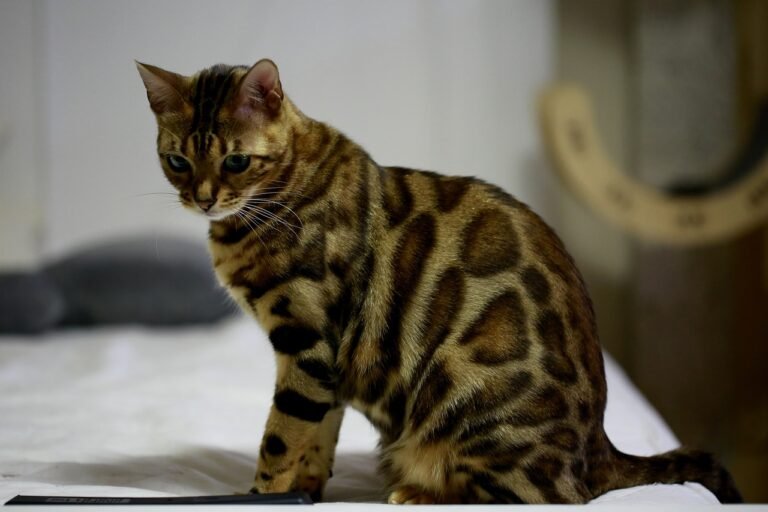
Are you dreaming of having a furry friend but worried about your cat allergies? Fear not! We’ve got the purr-fect solution for you with our guide on cats for cat allergies.
Dive into our list of the 11 best cats for cat allergies and discover how you can manage those pesky allergies while still enjoying the love and companionship of a cat. Get ready to find your new best friend without sacrificing your health!
Read on to find out how you can make living with a cat more comfortable and enjoyable.
Understanding cat allergies and common triggers
Cat allergies are caused by proteins found in a cat’s skin cells, urine, and saliva. Common triggers exposure to cats for cat allergies sufferers include:
- Petting or touching a cat.
- Breathing in cat dander.
- Being in close proximity to a cat.
Symptoms of cat allergies can include sneezing, runny or stuffy nose, itchy or watery eyes, and, in some cases, skin rashes or hives. It’s important to keep in mind that even hairless or hypoallergenic breeds can still produce allergens. So, even if you have chosen your feline friend from the breed of cats for cat allergies, you can still have an allergic reaction. If you suspect you have a cat allergy, it’s best to consult with a healthcare professional for proper diagnosis and management.
Breeds of cats that are hypoallergenic or produce less allergens

Several breeds of cats for cat allergies are known for producing fewer allergens or being hypoallergenic. Keep in mind that no cat breed is completely hypoallergenic, but these breeds may produce fewer allergens than others. If you pick such a breed of cat for cat allergies, you can manage the allergic reactions better.
It’s important to spend time with a cat before bringing them into your home to see how you react to their dander. Regular grooming and keeping your home clean can also help reduce allergens. If you have allergies, it’s important to take these steps to ensure a comfortable living environment for both you and your new pet.
Finding your purr-fect match: 11 Best Cats for cat allergies
If you suffer from cat allergies but still want to have a feline friend, several breeds of cats for cat allergies are known to be more hypoallergenic than others. Some of the best cats for cat allergies include the Balinese, Russian Blue, Sphynx, Bengal, and Oriental Shorthair. These breeds produce fewer allergens and can be a great option for allergy sufferers who still want to enjoy the company of a cat –
1. Siberian
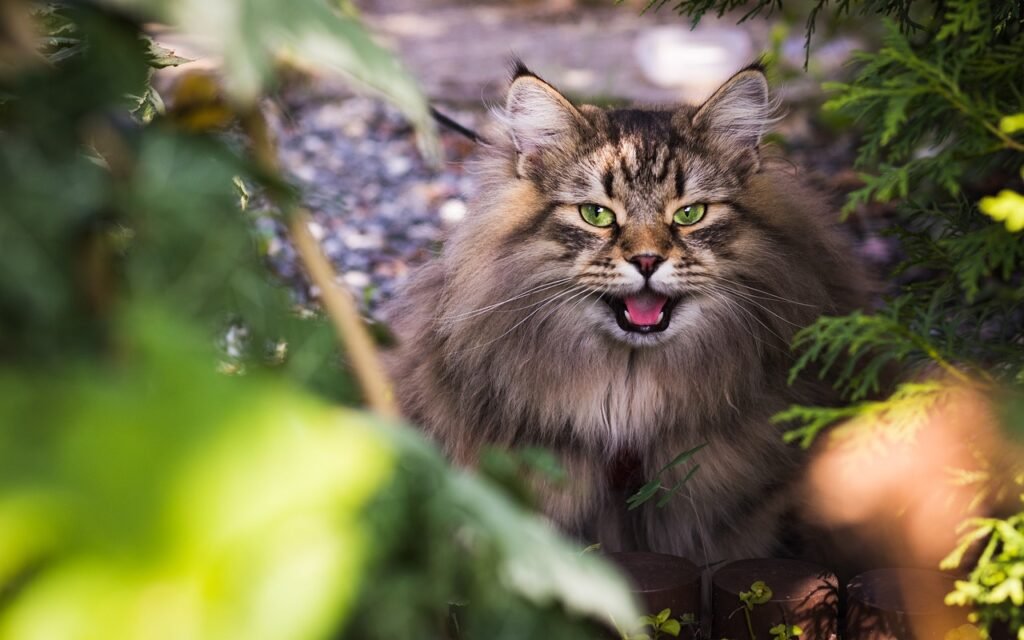
Despite their luxurious, long fur, Siberian cats are often considered hypoallergenic because they produce lower levels of the ‘Fel d 1’ protein, which is the primary allergen in cats. Originating from Russia, these cats have adapted to cold climates with their dense, water-resistant coat. Siberians are known for their friendly and affectionate nature. They are also intelligent and playful, making them excellent companions for families with children and other pets. Regular grooming is necessary to keep their coat in good condition and to reduce allergen spread.
2. Balinese
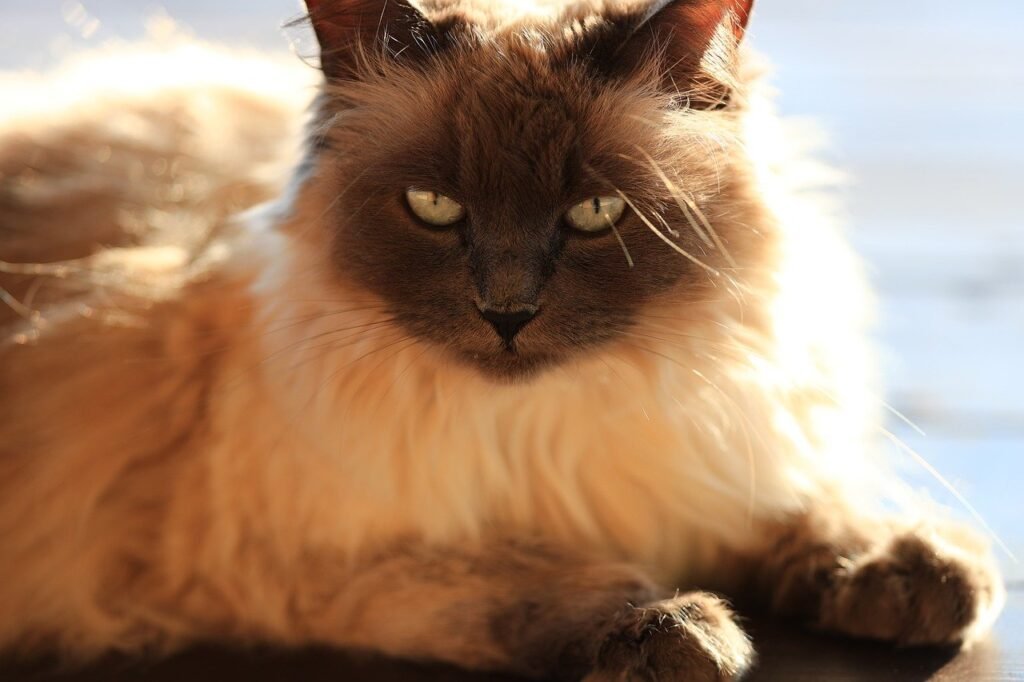
Balinese cats, also known as the “long-haired Siamese,” are known for their silky, fine coat and striking blue eyes. They produce less Fel d 1 protein compared to many other breeds and are one of the best breeds of cats for cat allergies. Balinese cats are highly social and vocal, often engaging in “conversations” with their owners. They are intelligent, curious, and playful, making them great pets for active households. Their coat requires moderate grooming to prevent matting and to keep it looking its best.
3. Bengal
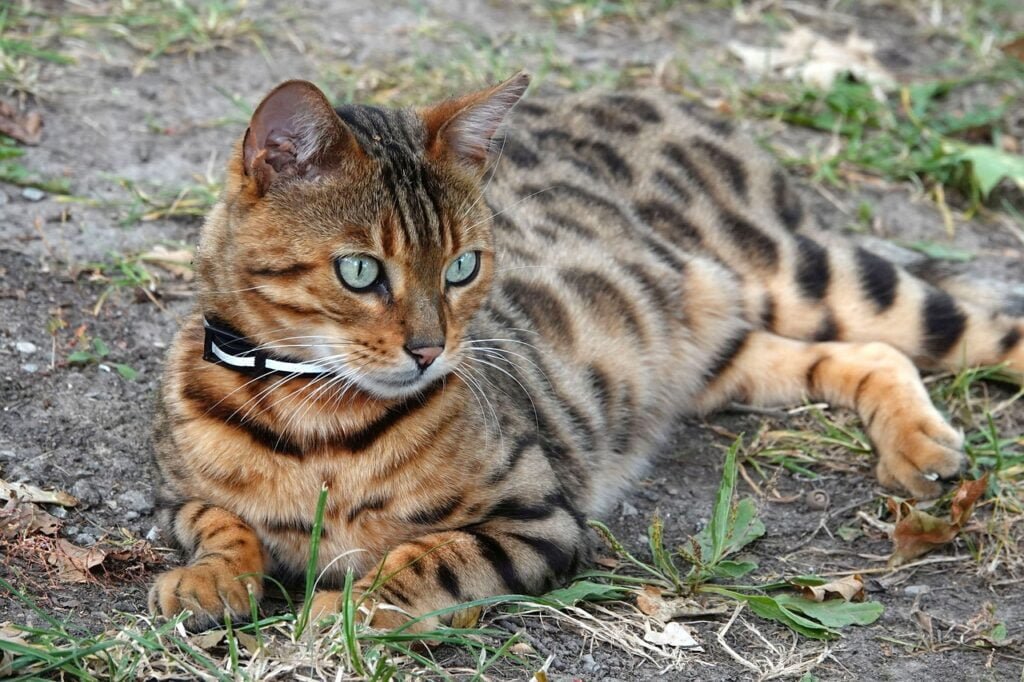
Bengal cats have a short, dense coat that requires minimal grooming, which helps in reducing the amount of dander spread around the home. They produce fewer allergens than many other breeds and considered one of the best cats for cat allergies. Bengals are known for their wild appearance, with a distinctive spotted or marbled coat that resembles that of a leopard. They are highly energetic, intelligent, and playful, often enjoying activities like climbing and playing with water. Bengals thrive in homes where they can receive plenty of mental and physical stimulation.
4. Oriental Shorthair
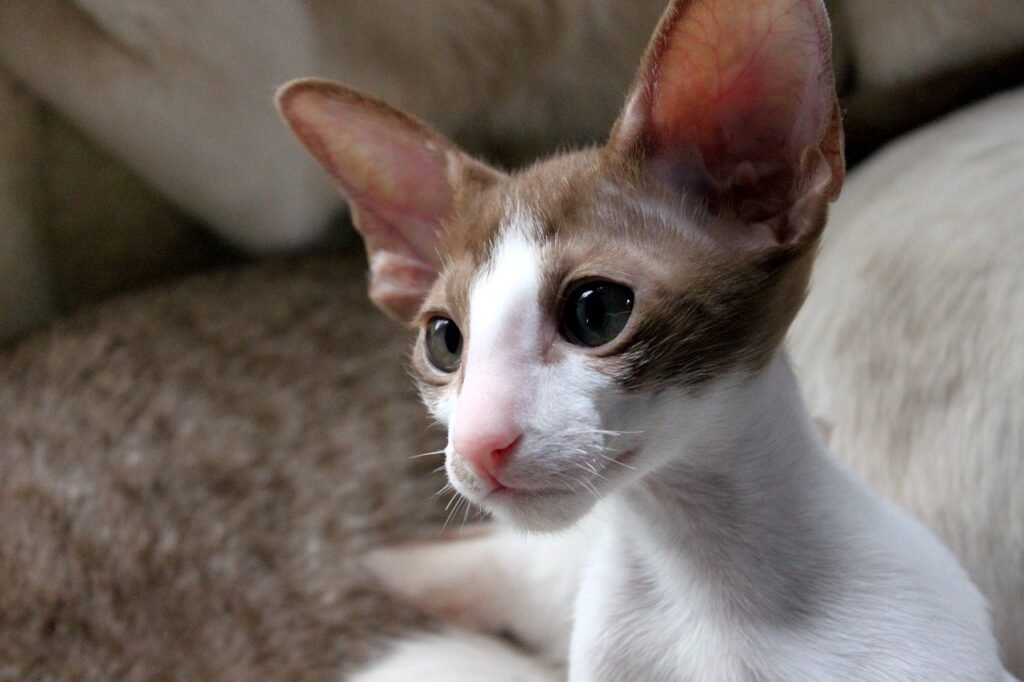
Oriental Shorthairs are closely related to the Siamese and share similar hypoallergenic qualities. Their short, fine coat sheds less, which helps in reducing allergen spread. So, oriental shorthairs are one of the best cats for cat allergies. These cats come in a wide variety of colors and patterns. Oriental Shorthairs are active, curious, and social, enjoying the company of their human companions and other pets. They are known for their vocal nature and will often communicate with their owners.
5. Devon Rex
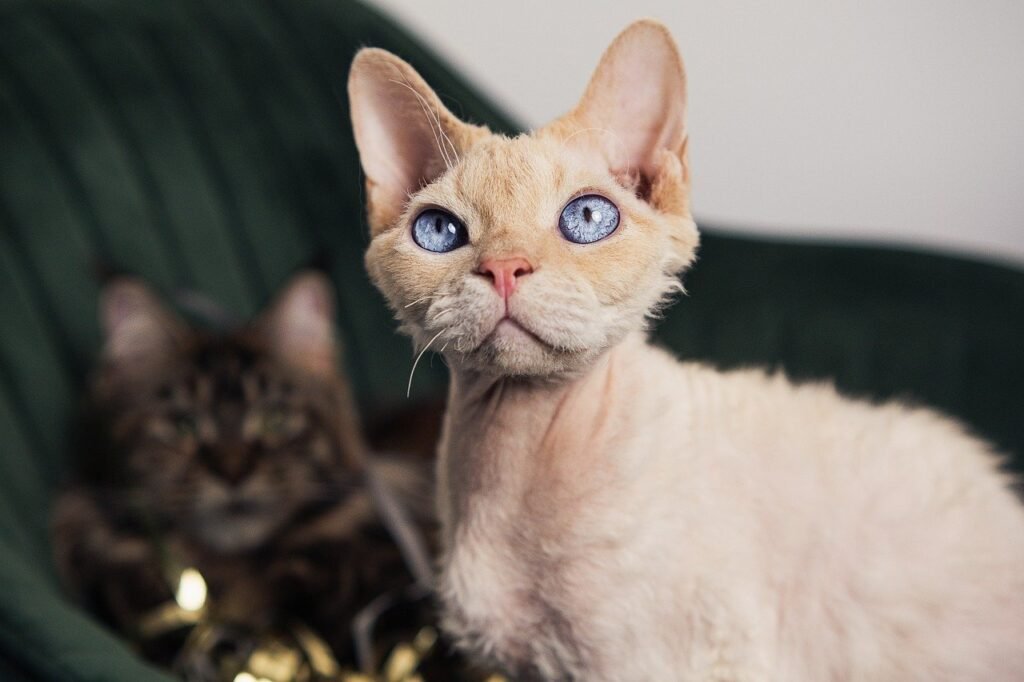
Devon Rex cats have a unique, wavy coat that sheds very little, making them a good choice for allergy sufferers. This makes Rex one of the ideal breeds of the cats for cat allergies. Their coat is soft and requires minimal grooming. Devon Rexes are playful, mischievous, and very affectionate. They enjoy being involved in their owners’ activities and are known for their clownish behavior. Their friendly and sociable nature makes them great pets for families and individuals alike.
6. Cornish Rex
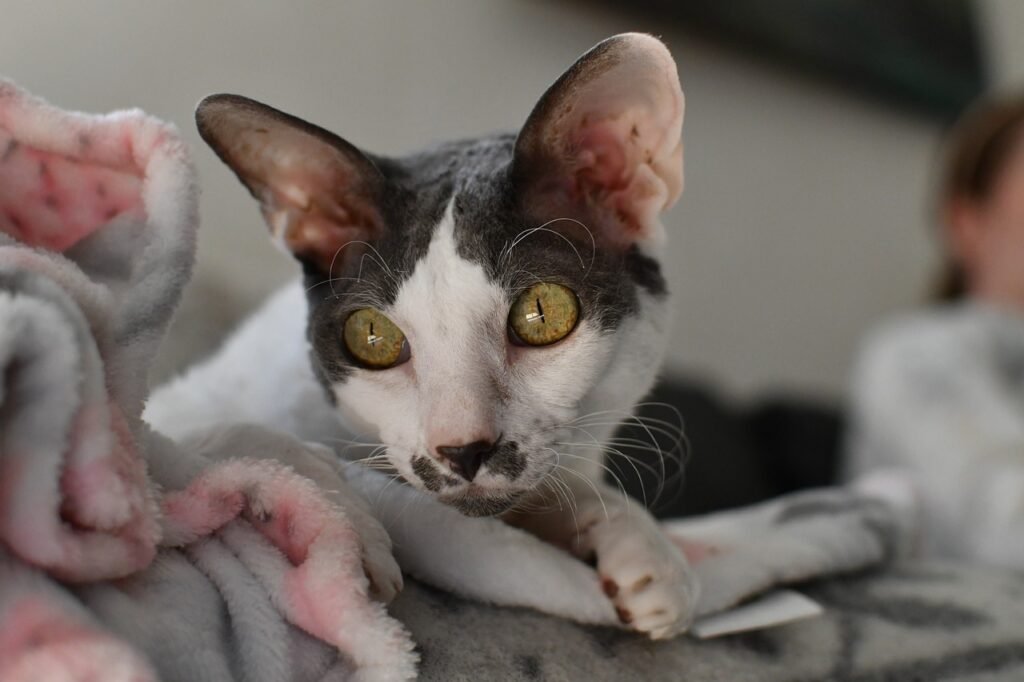
Cornish Rex cats have a distinctive curly coat that is soft and fine. Their coat sheds minimally, which can help reduce allergen levels in the home. Cornish Rexes are highly active, intelligent, and affectionate. They are often described as having dog-like personalities due to their loyalty and playful behavior. These cats enjoy interactive play and can be trained to perform tricks. They require regular playtime and mental stimulation to keep them happy.
7. Sphynx
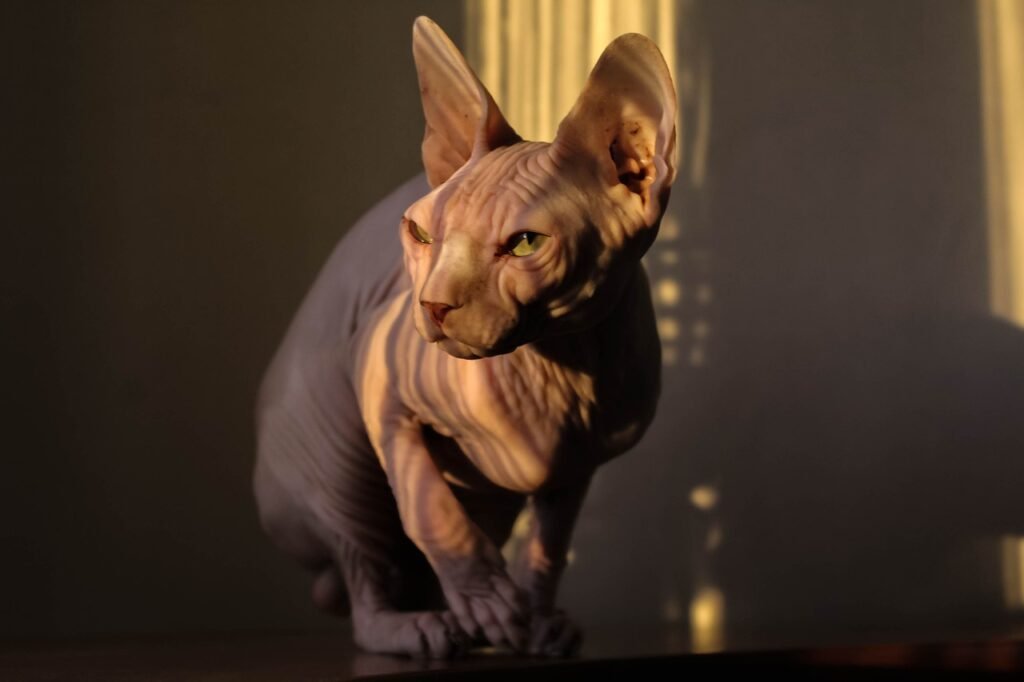
The Sphynx is perhaps the most well-known hypoallergenic breed due to its lack of fur. While they don’t shed, they do produce skin oils that need to be managed with regular baths. Sphynx cats are known for their extroverted and energetic nature. They are highly social and enjoy being the center of attention. Despite their lack of fur, Sphynx cats are very warm to the touch and often seek out warmth from their human companions.
8. Russian Blue

Russian Blue cats have a dense, double-layered coat that traps allergens close to their skin, reducing their spread into the environment. They produce lower levels of Fel d 1 protein compared to many other breeds. Russian Blues are known for their gentle, reserved, and quiet nature. They form strong bonds with their owners but can be shy around strangers. Their short, plush coat requires minimal grooming.
9. Javanese
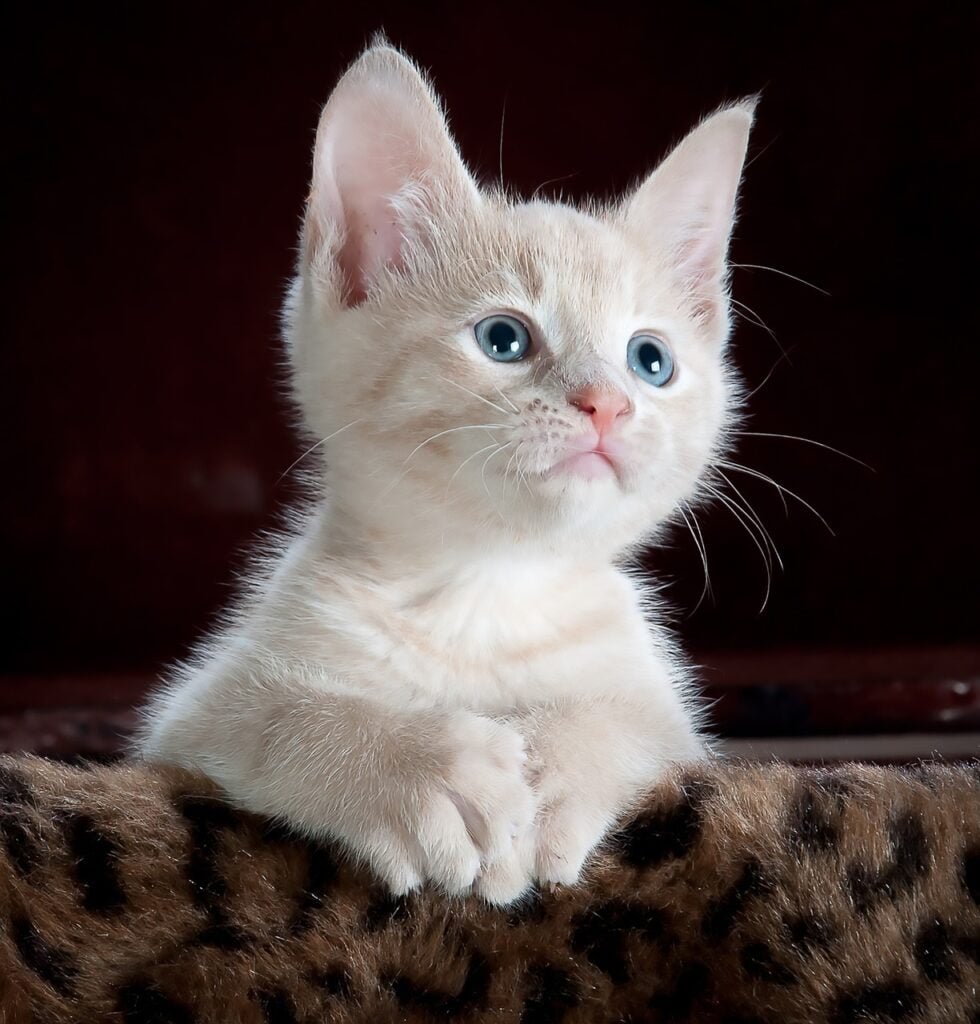
Javanese cats are similar to Balinese and Siamese cats in their hypoallergenic qualities. They have a single-layer coat that produces fewer allergens. Javanese cats are vocal and affectionate, enjoying interactive play and socializing with their human companions. They are intelligent and curious, often exploring their environment with enthusiasm. Regular grooming helps keep their coat in good condition.
10. LaPerm

LaPerm cats have a curly or wavy coat that comes in both short and long lengths. Their unique fur minimizes shedding and the spread of allergens. LaPerms are friendly, affectionate, and adaptable, making them great pets for various household environments. They are known for their gentle and loving nature, often seeking out attention from their owners. Their coat requires regular grooming to maintain its texture and prevent matting.
11. Siamese

Siamese cats are known for their sleek, short coat, which sheds less than many other breeds, thus reducing allergen spread. They produce a lower level of Fel d 1 protein. Siamese cats are highly social, vocal, and affectionate. They are very intelligent and enjoy interactive play and puzzle toys. Siamese cats form strong bonds with their human companions and thrive in environments where they receive plenty of attention and interaction.
Ps – Each of these breeds has unique qualities and characteristics. Still, they all share the common trait of being more suitable for allergy sufferers due to their lower allergen production or reduced shedding.
Tips for managing allergies while living with a cat
Living with allergies while having a cat can be challenging, but there are ways to manage them especially if you choose the right breeds of cats for cat allergies.. Here are some tips for managing allergies while living with a cat:
1. Keep your home clean: Regularly vacuum and dust to remove cat dander from your home. Consider using a HEPA air purifier to help trap allergens.
2. Create a cat-free zone: Designate certain areas of your home as off-limits to your cat to give yourself a break from allergens.
3. Groom your cat: Regularly brush and bathe your cat to reduce the amount of dander they shed.
4. Wash your hands: After handling your cat, wash your hands to remove any allergens.
5. Consult a doctor: Talk to your doctor about allergy medications or immunotherapy options to help manage your symptoms.
Best practices for keeping your home allergen-free
There are several best practices for keeping your home allergen-free.
First, it’s important to regularly clean and dust your home to remove any potential allergens, such as dust mites, pet dander, and pollen. Using high-efficiency particulate air (HEPA) filters in your vacuum and air purifiers can also help to reduce allergens in the air. Additionally, washing bedding and curtains in hot water can help to eliminate dust mites and other allergens.
It’s also important to keep windows closed during high pollen seasons and to regularly clean or replace air filters in your HVAC system. Lastly, if you have pets, periodically grooming and bathing them can help to reduce pet dander in your home.
Introduction to allergy-fighting products and technologies
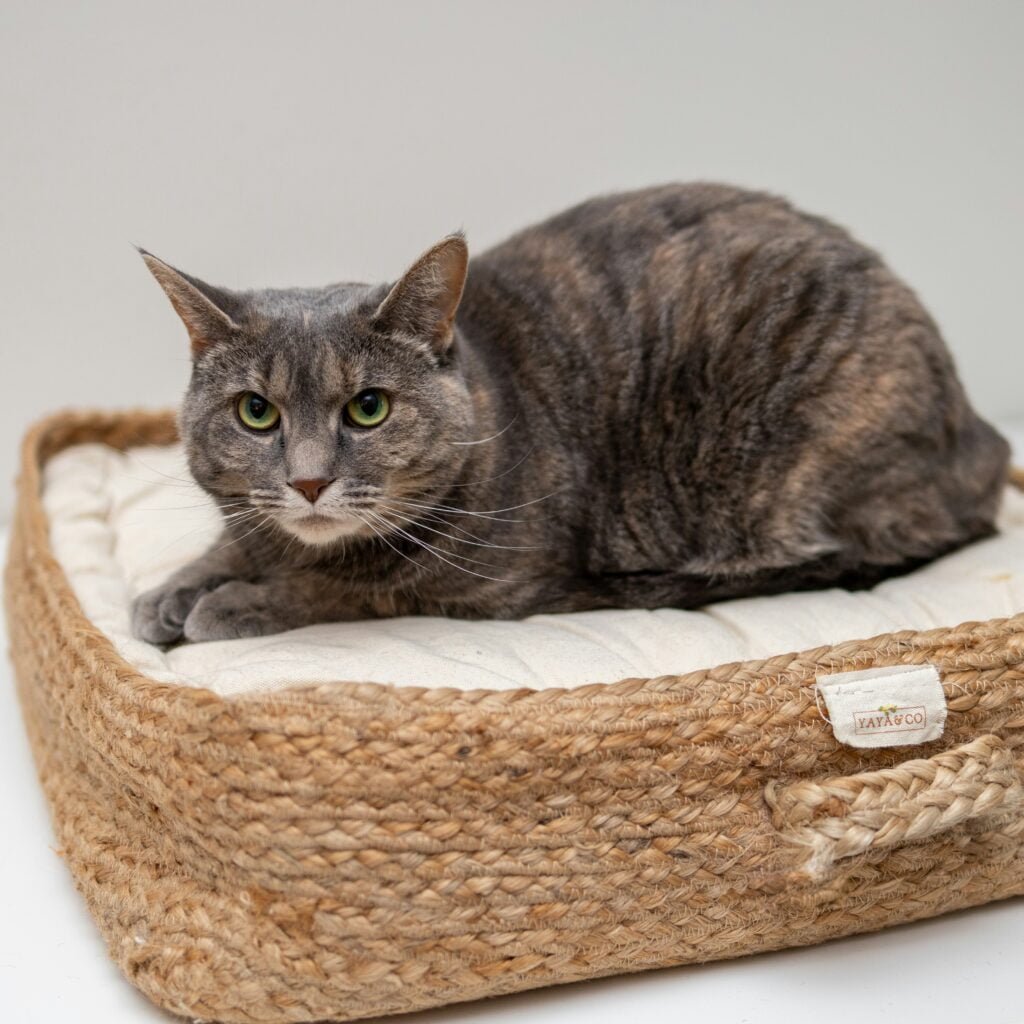
Allergy-fighting products and technologies are designed to help individuals manage and reduce their allergic reactions to various allergens. These products and technologies can include air purifiers, hypoallergenic bedding, allergy-friendly cleaning products, and even mobile apps that track pollen levels and provide personalized allergy management tips. By integrating these tools into daily routines, individuals can minimize exposure to allergens and improve their overall quality of life.
Here are 10 allergy-fighting products and technologies that might come in handy for car owners –
1. HEPA Air Purifiers: Capture pet dander and other allergens from the air with high-efficiency filters, improving indoor air quality.
2. Allergen-Proof Bedding and Covers: Create a barrier against pet dander, dust mites, and other allergens, helping to maintain a clean sleeping environment.
3. Pet Bathing and Grooming Products: Reduce dander and allergens through regular bathing with hypoallergenic shampoos and using grooming tools.
4. Allergen-Reducing Pet Food: Specially formulated foods that promote healthier skin and coat, thereby reducing dander production.
5. Electrostatic Air Filters: Use static electricity to trap airborne particles, including pet allergens, enhancing air purification.
6. Allergen-Reducing Sprays: Neutralize allergens on surfaces like furniture and carpets, helping to maintain a low-allergen environment.
7. Robotic Vacuum Cleaners: Automate floor cleaning to consistently remove pet hair and dander, often equipped with HEPA filters.
8. UV-C Light Sanitizers: Use ultraviolet light to kill bacteria and other microorganisms, reducing allergens and improving air quality.
9. Dehumidifiers: Reduce humidity levels, making environments less conducive to dust mites and mold, which can worsen pet allergies.
10. Specialized Cleaning Products: Formulated to remove allergens from surfaces and fabrics, these products help maintain a cleaner home environment.
Understanding the importance of regular grooming for allergy management
Regular grooming is essential for managing allergies in both humans and pets, particularly for those who choose specific breeds of cats for cat allergies.. When you groom regularly, you remove allergens such as pet dander, dust, and pollen from the skin and fur, reducing the likelihood of allergic reactions. Grooming also helps to maintain healthy skin and coat, which can, in turn, reduce allergic reactions. Additionally, keeping your living environment clean through regular grooming can also help to minimize allergens in the home.
Creating a safe and comfortable living environment for both you and your cat
Creating a safe and comfortable living environment for both you and your cat is important for their well-being and your peace of mind. It’s important to provide a space that is free of hazards such as toxic plants, small objects that can be swallowed, and open windows or balconies that could pose a danger to your cat. Additionally, providing cozy and comfortable sleeping areas, scratching posts and interactive toys can help keep your cat happy and engaged. Regular vet check-ups and vaccinations are also crucial for maintaining a healthy living environment for both you and your feline friend.
Such a comfortable living environment will help you make the most of your time with your choice of cats for cat allergies.
Seeking professional advice and support for managing severe allergies
We recommend seeking professional help from an allergist or immunologist who can provide specialized care and support for managing severe allergies. They can conduct comprehensive testing to identify specific allergens and develop a personalized treatment plan, which may include medication, immunotherapy, and lifestyle modifications.
Even if you have chosen a hypoallergenic cat among the breeds of cats for cat allergies, you will still have to take preventive steps. It’s important to have a proactive approach to managing severe allergies to minimize the risk of serious reactions and improve overall quality of life.
Conclusion
Choosing a cat when you have allergies can be challenging, but with the right information on the best breeds of cats for cat allergies, you can find the perfect match for you. By considering hypoallergenic breeds and taking steps to manage your allergies, you can enjoy the companionship of a cat without suffering from allergies.
It’s important to consult with an allergist and spend time around different cat breeds to determine which ones trigger your allergies the least. With proper management and careful consideration, you can find a cat that fits your lifestyle and won’t aggravate your allergies.


